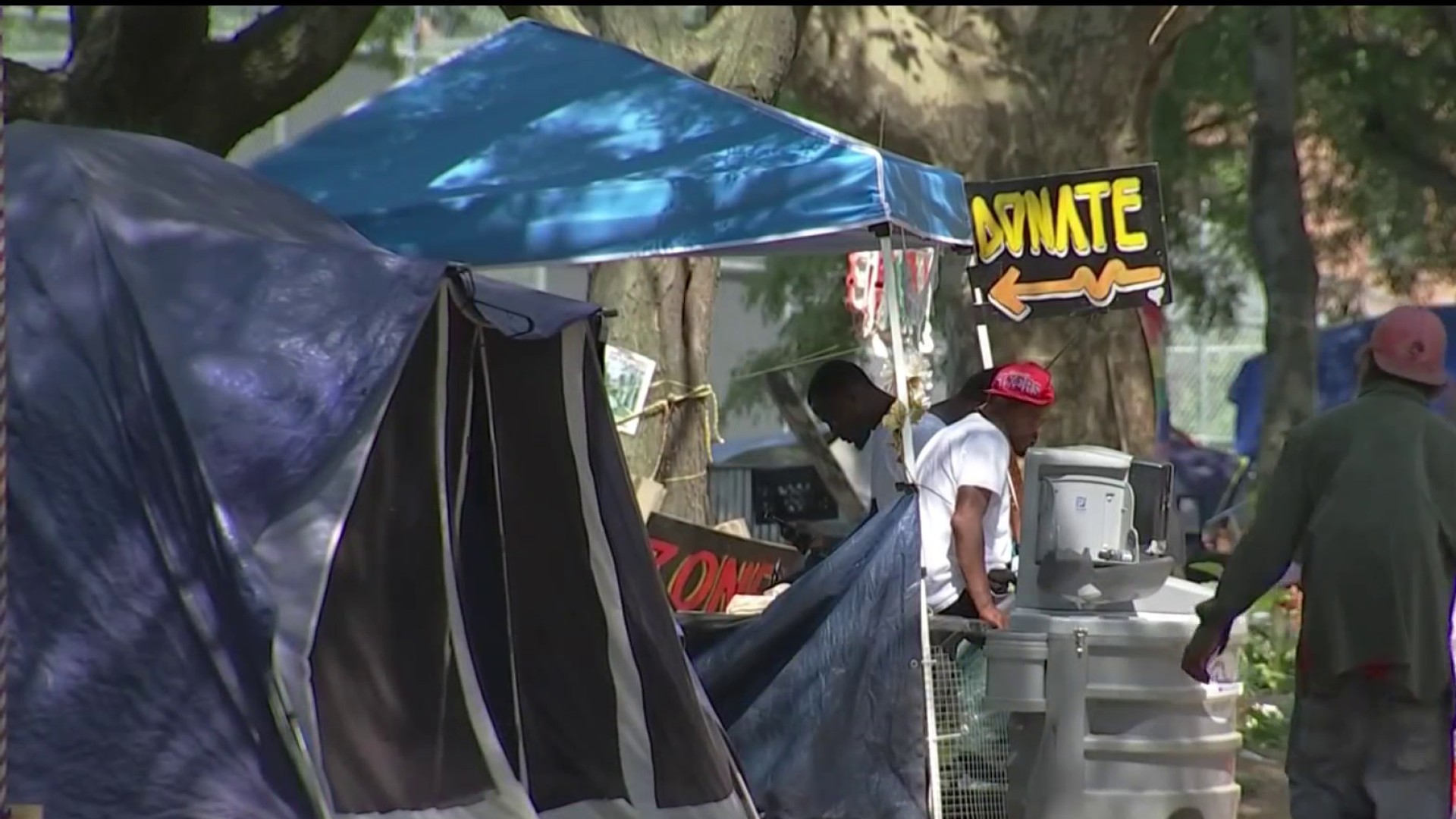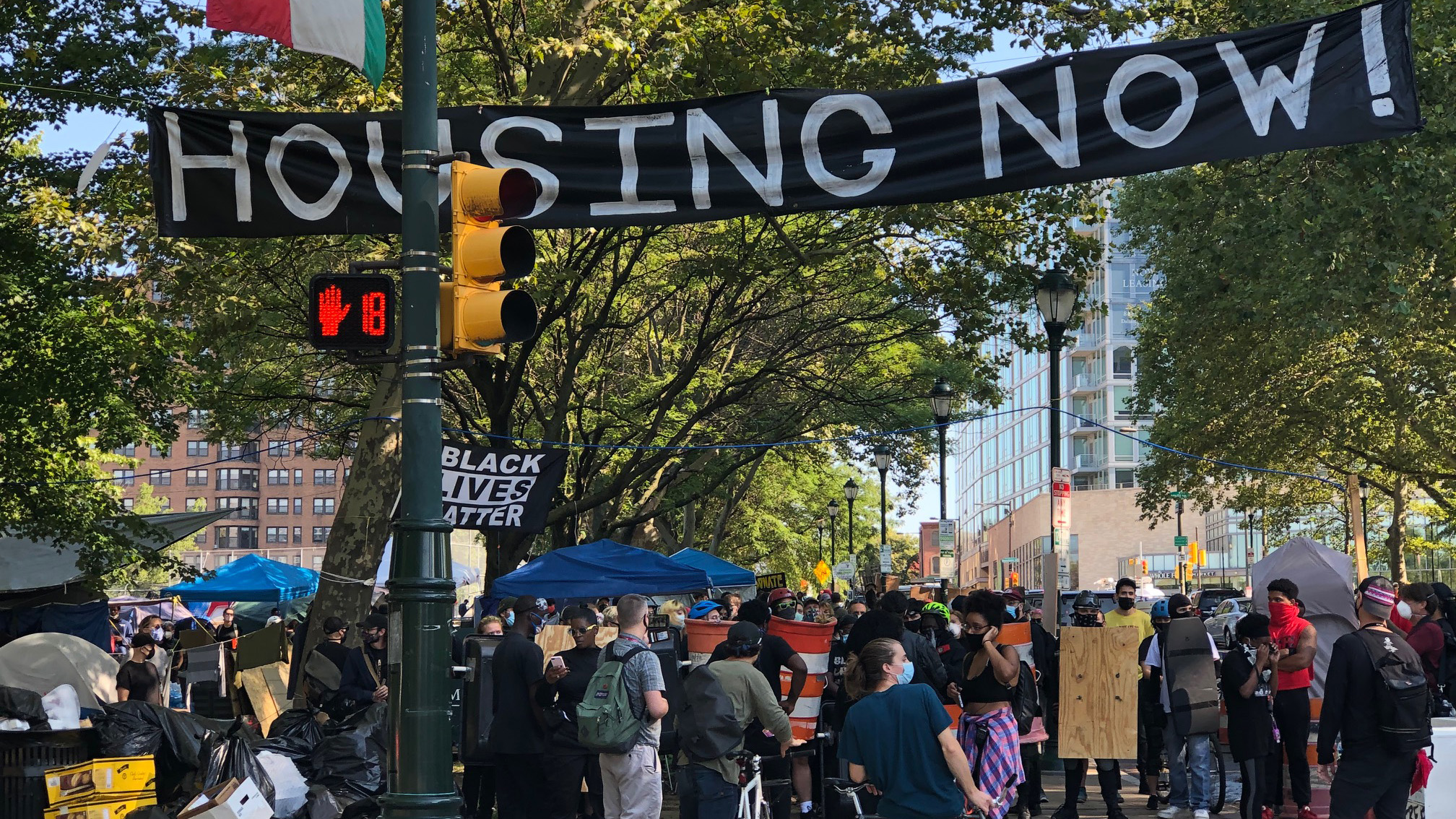A day after a city’s eviction deadline, protesters who are speaking out against homelessness remain at camps in Philadelphia. So what will happen now? NBC10’s Lauren Mayk investigates.
Philly leaders said they're not ready to discuss whether force will be used to evict people at 3 homeless camps in the city, as several tents, residents and activists remained at the sites past a 9 a.m. deadline to vacate.
“We’re getting together and discussing what various options we have, but I’m not going to tell you exactly what we’re doing today,” Philly Mayor Jim Kenney said.
City outreach teams and members of the clergy were out at the camps Wednesday to offer services like shelter beds, drug treatment and spots in a hotel designated as a coronavirus prevention site for vulnerable populations. Eight people left the camps to approach the outreach workers and get services Wednesday, city leaders said.
Organizers of the camps say won't pack up until the city makes concessions including granting permanent affordable housing for all residents. The city says that's impossible due to a lack federal funding, and point out the other services.
Get top local stories in Philly delivered to you every morning. Sign up for NBC Philadelphia's News Headlines newsletter.
Many camp residents along the Benjamin Franklin Parkway have said they prefer the camp to a homeless shelter, the service most commonly and immediately available to them. Others don't want to compromise from their demand for permanent affordable housing. Kenney said Wednesday that he believes because of people leaving to get services, more activists than homeless residents are in the camps at this point. But he also said his count may be off, because city outreach workers haven't been allowed into the camp. Those workers were outside, but keeping their distance from the rally, across the street from the Parkway camp Wednesday.
There is another camp behind the Museum of Art and a third near the Philadelphia Housing Authority headquarters in North Philly.
Even the number of people taken into city services is in dispute between the two sides. The city says over the past 3 months, 139 people from the camps were admitted into services such as drug treatment, shelters or the COVID hotel. Camp leaders believe that number includes people who have returned to the camp after spending nights in a shelter.
"They're human beings like all of us, so they come and go," said Liz Hersh, director of the city's Office of Homeless Services. "Sometimes they go and they stay overnight, and sometimes they come back to hang out with their friends during the day. Sometimes they try a different program. These aren't locked cells or anything like that."
At a morning rally and press conference at the camp on the Parkway, organizers reiterated demands for permanent housing, increasing the city budget for homeless services, and giving community members a say at the city Managing Director's office.
"We will not go quietly," said organizer Jamaal Henderson. "We will not just disappear and live in a back alley somewhere because the city or the state or the country doesn't deem us worthy."
"We have issued our demands, and the major one that Mayor Kenney needs to pay attention to is housing for homeless people now," said Henderson. "Not tomorrow, not next year...You can pull money from the police that you pay now to terrorize homeless people, and use that same money to put people in affordable housing."
Organizers of the camp anticipated a police presence and called for people to stand with them Wednesday. Barricades made of wood pallets were set up as makeshift fences at multiple camps.
In a news conference Tuesday, Kenney said the situation at the camps had become "untenable" due to what city officials have called unsanitary conditions and safety issues.
Kenney has said officials have negotiated with organizers and others in the camps for nearly months and credited the protests with bringing new attention to homelessness.
Organizers set up barricades around the area as they chanted "Black lives matter."
Plans to evict camp residents were stalled last month after a federal lawsuit seeking an injunction. But late last month, a judge gave the green light for the city to clear out the camps, as long as the city posted at least 72 hours' notice and made efforts to stored and return any property that would be seized while clearing the camp.
The tent camp of more than 100 people on the Parkway was erected on a baseball field June 10. Organizers said the camps were tied to the Black Lives Matter movement and were demanding equal access to fair, safe and affordable housing. Philadelphia Housing Action — the coalition of groups that organized the encampment — said it was conceived as a form of political protest over homeless policies and the lack of low-income housing.
A lawyer representing occupants had asked the judge to block the eviction, arguing that the sites were protected by the First Amendment. City officials argued that the settlements violated city laws prohibiting camping and that the tent village on the Parkway, in particular, posed a threat to public “health, safety and welfare.”
They also said they are planning a pilot “tiny house" village and are instituting a rapid rehousing program including up to two years of rental aid for people living on the street.



